" Joker is a hyper-familiar origin story so indebted to Taxi Driver and The King of Comedy that Martin Scorsese probably deserves an executive producer credit."
That is the second sentence in IndieWire critic David Ehrlich's already widely-quoted review for Todd Phillip's Joker. At the time that Ehrlich was using phrases like "directed by a glorified edgelord" and "it's a toxic rallying cry for self-pitying incels" the rest of the Venice Film Festival was falling over itself with praise for Phillips' surprisingly provocative film and Joaquin Phoenix's Oscar-bound performance. Since then, not only have other critics joined Ehrlich's way of thinking the film itself has become such a cultural lightning rod that Warner Bros. took the rare step of barring all reporters from the Los Angeles premiere. Their explanation: "A lot has been said about Joker, and we just feel it's time for people to see the film."
Fair enough, I suppose. I have yet to see the film myself, which is why I have been reluctant to weigh in on the controversy. I do have a ticket to see Joker Thursday night. I'll share my thoughts after that. This morning, however, I sat down to watch one of the other film's Ehrlich referenced: 1983's The King of Comedy.
Taxi Driver, the other Scorsese film he mentioned, is a classic. For better or worse, its poster has peered down from many a dorm room wall over the years. The King of Comedy, on the other hand, is somewhat more obscure. It bombed in its day, and though it has enjoyed a critical reappreciation in recent years it is still not the first, second, or third movie you mention when you talk about Martin Scorsese. The Guardian, in 2010, tried to change that by arguing The King of Comedy is actually the director's best movie. I disagree. So does Scorsese. In fact, he hasn't watched The King of Comedy since he made it. "It's very unsettling," he's said.
Why?
What It's About
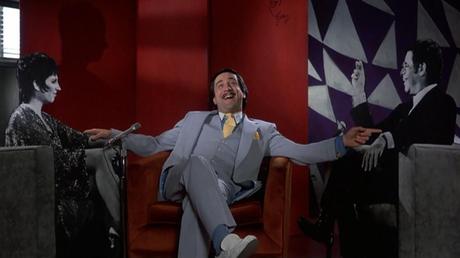
Rather than ply his trade on the New York City stand-up circuit, a 34-year-old aspiring comedian named Rupert Plopkin (Robert De Niro) tries to leap straight to the front of the line by directly lobbying his favorite talk show host Jerry Langford (Jerry Lee Lewis, remarkably restrained) for a spot on the next episode. In his fantasy life, he imagines a future where he and the host are not only close friends but colleagues. When the real world crudely disabuses him of that notion, he turns to far more drastic measures to get his damn tight five.
How It Got Made
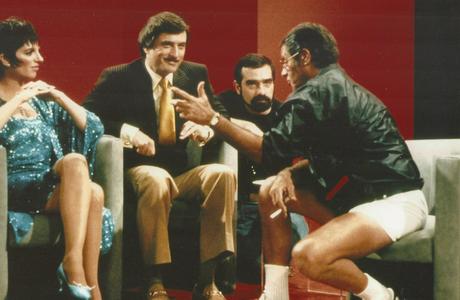
Martin Scorsese dragged his feet on The King of Comedy script for nearly 8 years. Then when he picked the movie to be his Raging Bull follow-up he was chronically late to set and frustratingly indecisive once he got there. By the end of the first week of shooting, Scorsese had already been on the receiving end of a "you need to respect our time and act more professionally" tongue-lashing from Jerry Lewis.
Looking back on all of that for Richard Schickel's book Conversations With Scorsese, the director blamed himself and admitted the film's subject matter weighed on him. "It was really unpleasant to shoot. I found that I didn't like dealing with the story; it was so unpleasant and it crossed so many lines that normally divide private and public lives."
When he first got the script in 1974, he didn't find it disturbing. Instead, he didn't really understand it:
"Bob De Niro gave me the script when I was doing Alice [ Doesn't Live Here Anymore], I think, and I didn't get it. I just thought Paul Zimmerman, who did the script, was a wonderful writer. The script is hilarious. But I thought the movie was just a one-line gag: [ Spoiler] You won't let me go on the show, so I'll kidnap you and you'll put me on the show. After I took Alice, Taxi Driver, New York, New York, and Raging Bull around the world to different festivals, I took a look at the script again and I had a different take on it. I began to understand what Bob's association with it was, what he went through after Mean Streets, certainly after Godfather II - the adulation of the crowd, and the strangers who love you and have got to be with you and have got to say things."
Scorsese came to realize there was a little bit of Rupert Plopkin in him. Like the character, when he was first starting out he would do anything to jump the line and get something made. Plopkin's unending visits to Langford's office in hopes of securing a one-on-one meeting hit close to home. "It's the same way I made my first pictures with no money and with constant rejection-going back and going back and going back until finally, somehow, you get a lucky break."
De Niro didn't identify nearly as much with Plopkin. Instead, he saw his own stalkers in him. During the production of Raging Bull, the actor was hounded by a stalker who had somehow obtained his telephone number. He made the unusual step of agreeing to actually meet the stalker to try to understand his mindset, asking "Why are you stalking me? What do you want?" Rather than directly answer, the man - accompanied by his embarrassed-looking wife - peppered the actor with endless questions. Sensing he'd made a mistake, De Niro cut the conversation short. His stalker, of course, kept calling him.
This fan-celebrity relationship, of course, is something De Niro would later revisit in Tony Scott's 1996 film The Fan, suggesting this is a longstanding fascination of his. Scorsese isn't quite as drawn to it, largely because it scares him. Looking back on The King of Comedy years later, he admitted maybe it shouldn't have been the movie he picked to be his fourth collaboration with De Niro. "We had explored everything we could do with each other on Raging Bull. I should have waited for something that came from me."
Scorsese's Take
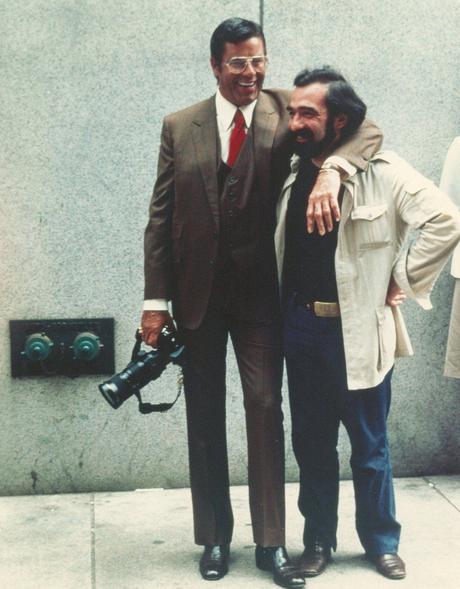
" King of Comedy is my coming to terms with disappointment, disappointment with the fact that reality is different from the dream. When I first went to L.A. in 1970, there was a little bit of a need in me to buy into, participate in, the dream of celebrity. By the early eighties, I began to notice what was happening to the cult of celebrity. And I like making fun of it." - Conversations With Scorsese, Richard Schickel
"I wanted to look at what it's like to want something so badly you'd kill for it," Scorsese said. "By kill, I don't mean kill physically, but you can kill the spirit, you can kill relationships, you can kill everything else around you in your life." - Martin Scorsese: A Retrospective
My Take
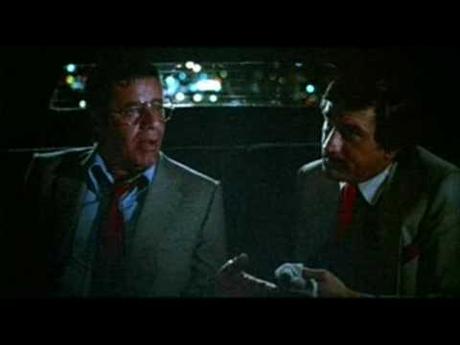
King of Comedy 's opening sequence establishes the roadmap for the rest of the film:
Through sheer hustling, a clearly people-pleasing, deferential but quietly desperate man named Rupert Plopkin puts himself between a crazed mob and Jerry Langford and ends up in the celebrity's limo. Through sheer persistence and charm, he manages to get Langford to commit to maybe listening to his stand-up material and offer some notes. What a potentially epic career breakthrough!
Except Plopkin doesn't know to take "yes" for an answer. When Langford's limo reaches its destination, both men exit the car and seem set to part ways. Whether Langford actually meant what he said remains to be seen, but for a moment they seem to be on good terms. However, Plopkin just can't help himself. He continues to ask for more and more and more, practically inviting himself to dinner with a man who was possibly just being passive-aggressive and nice to get out of an awkward situation. "How can I get rid of this guy?" a frustrated Langford seems to be thinking.
So, we cut to them sharing a meal together. Except, hold on, did Plopkin's outfit just change? And why does it look like he's not even sitting at the same table?
That's because without warning or explanation King of Comedy has just cut into a fantasy sequence. Plopkin didn't really get that meal with Langford, but in his fantasy he did and it was the start of a beautiful friendship.
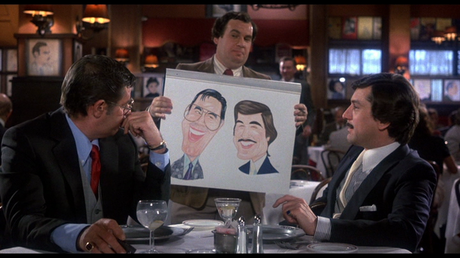
This pattern of Plopkin behaving in the real world like he's an actual someone - he always dresses like he's on his way to host his own talk show, and never takes no for an answer - and escaping into fantasies where he's the most beloved comedian in the country continues long enough that you eventually get the hang out of it. It is truly the portrait of a sad and pitiable man.
King of Comedy' s most ingenious trick comes halfway through when the pattern breaks and what we assume to be yet another fantasy sequences turns out to be real and ends with Plopkin utterly humiliated. It's an ingenious bit of a rug-pulling and tees up the second half which teeters into more aggressive stalking.
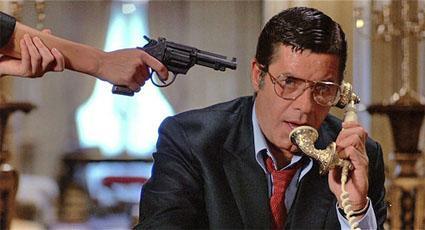
We have to remember that in the early eighties, stalking wasn't yet fully appreciated for the true threat it presented. California didn't pass the nation's first anti-stalking law until 1990, and that was only after several high-profile actresses had been attacked, including De Niro's Raging Bull co-star Theresa Saldana. In 1982, she survived a stalker's knive-attack thanks to a brave passer-by, heart-lung surgery, and 26 pints of blood. At the close of the decade, actress Rebecca Schaeffer wasn't so lucky.
Plopkin and his co-kidnapper Masha (Sandra Bernhard, perfectly unhinged), a Jerry Langford fanatic, therefore anticipate much of what would come to pass in celebrity culture. However, the film never rises to the level of letting us believe they actually mean Langford physical harm. Spoiler, they use a fake gun to kidnap him, and while Plopkin's goal is clear - use Langford as a hostage to secure a slot on his talk show - all Masha wants out of it is a night of lovemaking with her celebrity crush. They're so inept at it that Plopkin can't even keep his own homemade cue cards straight while coaching Langford through a ransom phone call.
They don't have to present a definite physical threat, however, to be terrifying. Plopkin, especially, is an early version of the type of fame-obsessed character we've come to know through social media, reality TV, and so many other movies over the past 35 years. More than once, I was favorably reminded of To Die For, Gus Van Sant's 1995 satire about a TV-obsessed woman who doesn't totally get that being the center of attention is not a good thing when it means you're the lead suspect in your husband's murder trial.
However, I share Scorsese's early trepidation about King of Comedy's script. There aren't exactly a lot of plot points to be found along the way here, and we never truly understand why Plopkin is the way he is until the very end. Still, as a deeply cynical essay on the nature of celebrity and fandom K ing of Comedy impresses with is prescience.
How Does This Connect to Joker?
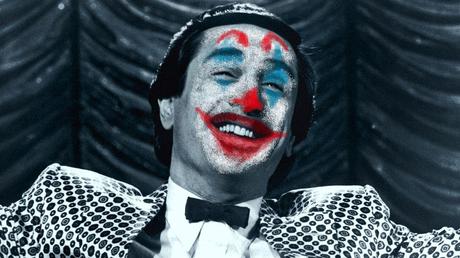
The King of Comedy is enough of an influence that when Joker first became a rumor and then an official production in 2017 it was erroneously reported that Scorsese was attached as an executive producer. According to Todd Phillips' Total Film: September 2019 interview, Scorsese was never officially involved in any way. Joker, instead, is the brainchild of Phillips and 8 Mile/ The Fighter writer Scott Silver.
However, Joker 's plot - a mentally ill, aspiring stand-up who struggles to tell the difference between his fantasies and reality inadvertently instigates a class war in 1980s New York and uses the wave of attention to threaten his way into scoring a standup set on his favorite talk show - is close enough to raise more than a few eyebrows. The fact that De Niro plays the talk show host - you either die Rupert Plopkin or live long enough to see yourself become Jerry Langford? - surely puts this into the intentional homage category.
" The King of Comedy reference is clear - we put De Niro in our movie intentionally," Phillips told Total Film before going on to deflect any "arent' you just ripping off Scorsese?" criticisms coming his way. "But 90% of the people who will see Joker have probably never seen The King of Comedy, and while I worship Scorsese, there are other influences. There's a little Dog Day Afternoon in it. There's a little Network. There's Cuckoo's Nest. These are all movies from a particular time when I was at a certain age. They sunk in. I'd love to say I grew up studying the great master painters of the 17th Century, but I grew up watching movies, and they got imprinted on me."
In a way, Phillips isn't up to anything new here. Marvel Studios and others have made an art out of grafting a comic book narrative on top of a recognizable film genre. Captain America: The First Avenger did it with the WWII movie, Winter Soldier aped 70s conspiracy thrillers, and Logan took on aging-gunslinger westerns like Unforgiven. The difference is those films evoke tone and feel; they don't typically lift entire plots. Exactly how guilty Joker is of this and how to feel about it is something I can't answer until I see the movie.
Random Parting King of Comedy Trivia
Plopkin calls Jerry Langford from the very same payphone Scorsese had used to pester producers in the early seventies.
Where to Watch
The King of Comedy isn't currently on any streaming service, but you can rent or buy a digital copy for cheap.
Sources: Total Film: September 2019, Conversations With Scorsese By Richard Schickel, Martin Scorsese: A Retrospective By Tom Shone
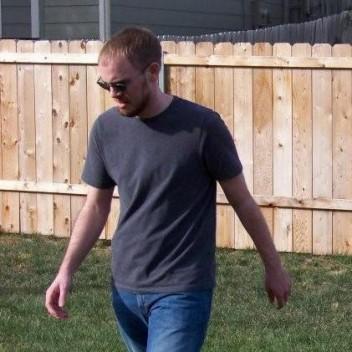
Grew up obsessing over movies and TV shows. Worked in a video store. Minored in film at college because my college didn't offer a film major. Worked in academia for a while. Have been freelance writing and running this blog since 2013. View all posts by Kelly Konda

